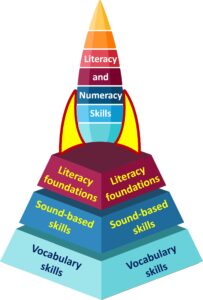
Preparing for success
Screen Your Early Years Students for the Foundations of Literacy and Numeracy Learning
(English Only)
Impress Your School Parents with Professional Assessment Reports
Early Years Profiler for ECD Institutions
Early Detection Solves Problems Before It Starts
In these troubling times, parents have many concerns. One of these is knowing if their child will be disadvantaged through missed learning opportunities. Experts agree that learning barriers at primary and secondary school levels often have their foundations in undetected problems at the early childhood level. International professionals designed the Profiler to help parents and caregivers identify knowledge gaps in the literacy and numeracy foundations. The screener is suitable for South African or internationally based children learning English in preparation for primary school. The screener test is also suited for learners who have entered the first formal school level and are there less than one year.
Designed to work on Mobile Phones, Desktops and Tablets, the Early Years Profiler screens your child in the critical areas discussed below. After each assessment, a detailed report is provided. Below are typical questions asked by institutions looking for a trustworthy solution. Group licenses for schools and groups are available – CONTACT US HERE
Who is the Early Years Profiler aimed at?
The Early Years Profiler is for 4 to 7-year-old children. It is for those acquiring the English language as a first or additional language. It is also helpful for anyone late to learning English for whatever reason. If you suspect that there are problems in reading in a slightly older child or those with special needs, you can try them on the test as well. The screener will detect any foundational literacy and numeracy issues.

How Does It Work?
The Early Years Profiler provides feedback in the form of a report, identifying what has and what should still be learnt. It does not grade kids, which can have a negative impact. Instead, it suggests the level that the child has achieved, starting with the lowest level of Novice and rising to Expert level. As a result, a sense of pride will be reached as children make minor improvements to their skills.


What Difference Will It Make?
What is done with the report can mean the difference between success and failure. Thus, the real key to success is what can be done with the result? It all depends on the child’s circumstances, experience, and learning context. Additional to the report is access to the Early Years Resource e-Book for parents, teachers or caregivers.
The Resource Book contains activities to assist learning in critical areas. The early detection of learning strengths and weaknesses allows one to share the feedback with the child’s parent. It also offers guidance on applying a quick support programme to ensure that the foundations of learning are solid. By identifying and remedying the areas your child needs urgent support in, one can guarantee a love for learning words and numbers.
As a result, a child will be well-prepared and familiar with the content and will not waste time repeating what they already know. In addition, support will ensure learning confidence and motivation, two essential constructs for being a happy learner.
How many times can I use the Early Years Profiler?
The Early Years Profiler can be used as often as you want to ensure that targeted skills are achieved. Once you have entered the child’s name, you cannot change it. If you would like to retest a child, you must use the same username and password. So please keep these safe where you can access them. If lost, then you will have to go into the management section and retrieve it. Many children can test at the same time if need be. You can test small amounts of content at a time. Each time you enter the system, you can resume where you have left off. You can also test specific areas if need be. The best device is an Android (not IOS/Apple) device. Little ones do best on a SMART phone or Tablet.

What areas are focused on, and why this is important?
The Early Years Profiler helps one understand three areas of your child’s basic English skills and abilities.
Early Years Vocabulary – Colours, Shapes, Letters and Number Testing:
Children learn to identify colours and shapes and classify objects around them based on these attributes. It is also essential to know if they have letter and number skills that form lifelong learning foundations.
Foundation Literacy Skills – Sound-Letter Correspondence, Syllables, Rhyming and Initial Sounds:
When children understand that words are comprised of sounds, they can transfer this knowledge to their reading and writing. Phonemic awareness is essential because it is critical to reading and spelling success. Children who cannot distinguish and manipulate the sounds within spoken language have difficulty recognizing and learning the necessary print/sound relationship critical to skillful reading and spelling success.
Visual Reasoning:
Measures fluid intelligence, which can quickly identify patterns, logical rules and trends in new information. It identifies causes and integrates this into existing knowledge, and applies it to solve problems.
The brick and mortar of literacy and numeracy
It has often been said that reading is not rocket science, which is true. So, what could be a better analogy? Maybe house-building. If you build a house on sand or do not use good quality cement, it probably will not be long before it falls down.
The same can be said with learning to read. It is all well and good to try to teach spelling, but if the pre-requisites are not there, the ability to spell (and read) will crumble quickly. The brick and mortar of literacy (and numeracy) are a firm basis of any underlying skills required before you teach a given skill.
When it comes to Early Years, it will be problematic to teach literacy in English if the child does not have the literacy foundations of distinguishing visually similar words, knowing sound-letter correspondence and can spell a few essential words. But to acquire adequate skills in those areas requires good skills in the area of sound-based skills – segmentation and manipulation. And in turn, if the child does not have the basic vocabulary skills, this learning of the next level will be problematic.
Thus, there is no “most important” level. Instead, think of it as needed to confirm every skill starting at what appears to be the simplest and progressing through the tests one by one. Only move to the next when the lesser skills are at a reasonable level.
Once the basics are in place, there should be a rapid lift-off to academic and personal success!
How do I buy it?
To assess any size group of ECD or first year level primary school learners, buy School License. It is highly affordsable – CONTACT US HERE.
